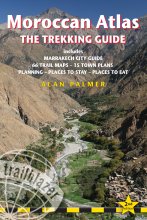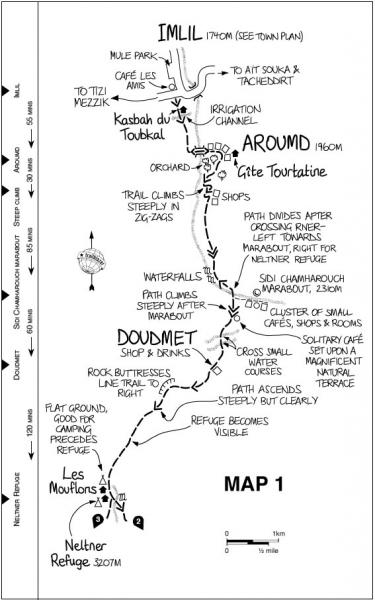I've said it before and I'll say it again, Trailblazer guides take some beating.
— Adventure Travel

Moroccan Atlas - the Trekking Guide
Excerpt:
Sample trek: Toubkal circular trek
Contents | Introduction | Minimum impact trekking | Planning your trip | Marrakech | Using this guide | Sample trek: Toubkal circular trek | Moroccan Atlas Trekking Routes
TOUBKAL CIRCULAR TREK
This route involves a climb to the summit of Jbel Toubkal (4167m/13,670ft). All trekkers should be aware of the symptoms and dangers of altitude sickness and the necessary response to them (see box pp258-9). Because of the proximity of Toubkal to Marrakech and the potential for a rapid ascent to the summit, many trekkers ascend too quickly and suffer the consequences. The route described here is the classic trek in the region and the one likely to be suggested by your guide, although it is perhaps not the ideal route to the summit. There are alternatives which would offer a more gradual, gentle approach and more time for acclimatisation. See the routes indicated by red dots on the 1:50,000 map for suggestions.
If you do choose to follow the route described here, do not rush straight from Imlil (1740m/5707ft), despite the lure of the peaks ahead of you, but spend a night there and even possibly a second at Aroumd/Around (1960m/6428ft), albeit that Aroumd is just a short morning’s walk beyond Imlil. The trail, even from Aroumd to Neltner Refuge (3207m/10,520ft), involves a steady but demanding climb of well over 1000m. The route description for this trek is arranged as a six-day trek. Allow seven days if you stay overnight at Aroumd.
Imlil–Aroumd/Around–Neltner Refuge [Map 1, p140]
From the Bureau des Guides, walk south through Imlil, passing first Hotel Étoile du Toubkal and then the mule park on your right. After five  minutes, just beyond Café les Amis, turn right onto the road to Tizi Mezzik/Mzik. After just two more minutes the path climbs to the left from the road and winds through trees towards Kasbah du Toubkal.
minutes, just beyond Café les Amis, turn right onto the road to Tizi Mezzik/Mzik. After just two more minutes the path climbs to the left from the road and winds through trees towards Kasbah du Toubkal.
Leaving the Kasbah behind, the path crosses an irrigation channel after 20 minutes then climbs more steeply still in a series of zigzags along a mule trail to the right. Follow the trail south for 25 minutes along the right-hand (west) bank of the valley until you are opposite the village of Aroumd. At this point turn steeply down to the river and cross by the bridge towards the village on the far side.
You may choose to enter the village itself. Behind the initial façade of a few newly built concrete houses, wind your way through its lanes to find a maze of traditional dwellings which form the heart of the old village. Aroumd has grown quickly in recent years and today 60% of its 1600 inhabitants are involved in tourism in some capacity. Accommodation is available: try Gîte Tourtatine ( Tel: 0524-36 16 80; GTM Tel: 0666-94 56 61; half-board 150dh, hot shower 10dh) at the eastern end of the village; it’s owned by Aït Tadrart Ahmed.
From Aroumd, pass a small walled orchard on your right and pick up the trail along the left (eastern) edge of the river bed which quickly opens out into a wide floodplain. Thirty minutes from the village, the trail leaves the valley floor, briefly climbing in zigzags to the left.
Follow the path past one small isolated shop selling soft drinks to a second, neither usually open before 10am. Do not, however, assume that the nearby irrigation channel provides clean water as it merely siphons from the river water flowing higher up in the main valley.
Continue to follow the path, climbing steeply in places, for a further 80 minutes, enjoying beautiful views both up and down river. Then, shortly after passing a series of small waterfalls, descend once more to the valley floor to cross the river close to the marabout of Sidi Chamharouch (2310m/7579ft).It’s possible to camp within the vicinity and very simple rooms are also available, although there are unlikely to be vacancies in summer particularly at weekends. There is no fixed price. A number of shops selling meals and drinks, as well as carpets and other Berber artefacts, face the religious complex from the right (western) bank. For a better view of proceedings return to the trail and climb up the right bank behind the shops, away from both the river and the throng surrounding the marabout, to a solitary café set upon a magnificent natural terrace offering a bird’s eye view.
From the café, the path continues to climb, yet more gently, to the south and south-west, before reaching another small café at Doudmet (not marked on either the 1:100,000 or the 1:50,000 maps) after about 60 minutes. Here drinks can be found cooling naturally in water falling from a rock buttress; the drinks and Berber artefacts can be bought from an adjacent shop.
The path remains clear until the CAF Neltner Refuge comes into view 90 minutes after Doudmet from which point you will still need a further 30 minutes to reach your goal for the day. During your approach you will cross several flat spaces which would be suitable for camping but if you decide to pitch tent, choose a sheltered spot if you can: the wind here can be very strong.
The long-established 90-bed, dormitory-style Neltner Refuge (also known as Refuge du Toubkal) never closes but is unfortunately often overcrowded, especially at weekends. Its price structure is somewhat complicated. CAF and British Mountaineering Council members pay as little as 46dh in summer (May to end Oct) and 92dh in winter (end Oct to end Apr); YHA members pay 69dh in summer and 115dh in winter; non-members pay 92dh in summer and 150dh in winter. There is ample sheltered camping space in the grounds of the refuge for 10dh per person per night. Breakfast is 25dh, lunch 40dh and evening meals 50dh. Alternatively the kitchen can be hired for a charge of 10dh per person. Showers can be taken for 10dh and a small shop sells cold drinks, including freshly squeezed orange juice (10dh), and other basic provisions, notably chocolate.
Registration is compulsory on arrival, both in the Register d’hotel and in the Fiche de nuitée refuge, for all staying in the refuge, although not for campers.
For 70 years the Neltner Refuge stood alone in the valley below Toubkal. Recently, however, new accommodation, Moroccan-owned Les Mouflons ( Tel: 0524-44 97 67, GSM: 0663-76 37 13, 0661-21 33 45/46, web: www.refugetoub kal.com) has been constructed alongside. Built with Berber-architectural traditions firmly in mind, grilled windows and coloured lanterns add atmosphere to very clean and spacious accommodation. Dormitory beds are available year-round for 80dh in summer and 100dh in winter. Breakfast is offered for 30dh (summer) and 40dh (winter) while a typical tagine costs 60dh (summer) and 70dh (winter). The kitchen can be rented for 25dh to cook a meal and showers are available for 10dh (summer) and 15dh (winter). A well-stocked shop provides essentials.
All trekkers who have not yet read the section on the symptoms and dangers of altitude sickness and the necessary response to them on pp258-9 are strongly advised to do so before setting out on Day 2.
Moroccan Atlas - the Trekking Guide
Excerpts:
- Contents
- Introduction
- Minimum impact trekking
- Planning your trip
- Marrakech
- Using this guide
- Sample trek: Toubkal circular trek
- Moroccan Atlas Trekking Routes
Latest tweets